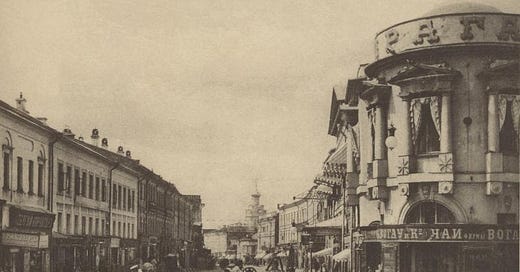In the breakfast room of the Ukraina hotel, Victor the waiter and his colleagues had been watering the tomato juice once again. They siphoned some of the juice from the big jars in which it was kept, topped it up with water, and sold or bartered the mixture. But Victor was good in word and deed when he agreed to show me the ‘real’ Moscow ‘.
In the 1980’s, when Mikael Gorbachev ran the Soviet Union, ‘glasnost’ (openness) and ‘perestroika (restructuring) were buzzwords almost everyone outside the USSR liked hearing about. As a good Soviet citizen, Victor liked pointing out that there was very little of either.
‘Look at our newspapers. The two big ones. Pravda, which is ‘Truth’ and Izvestiya which means News. There is no truth in Pravda and no news in Izvestiya.’
When I asked where I’d find a good café in Moscow, Victor recommended the Praga. I’d heard of the Praga but it was written up as a one of Moscow’s legendary and costly dining rooms. I said, ’But that’s a luxury restaurant.’
(The Praga is on the right. ( Pre-Revolutionary Moscow, late 19th century)
Victor enjoyed putting me right about the distance between what certain words pretended to mean, and what lay behind them.
‘A restaurant is a big cafe with fancy ideas. The Praga was once a very rough bar.’
Everything I’d read or imagined about the Praga was not the case at all. It had been a cafe, besides being many other things. Even its name was not what it seemed. Victor told me its name came from Braga, an old word used to describe home-brewed booze. The place was a dive to begin with, a pub, a tough drinking club, where cab drivers pulled in and downed shots of moonshine. Later, a wily Muscovite merchant won the entire building in a bet. He wagered he could win a game of billiards, using only his left arm. He spent lavishly and turned the building into the glitziest restaurant in town. After the Revolution, the Praga declined, once again. It became a cheap cafeteria and then, when Stalin took over, the Praga, was the preferred canteen of his selected bodyguards. The secret policemen's very secret pub.
I took a trip to the Praga. It is in the Arbat, an elegant neighbourhood of substantial buildings in honied stone with gables, pediments and imperial facades of yellow, rose, and pistachio. The Arbat was home to the aristocracy until they were exiled, or liquidated, in the Revolution.
I presented myself at the big doors of the Praga around midday and never got passed the doorman.
(The Praga in 1998, now closed, this time permanently)
When I told Victor what had happened, the waiter he was turned instantly into the junk bond dealer he yearned to be
‘I have a friend who knows someone who washes dishes in that kitchen. There are always more diners than places in the Praga. So, we have our business plan. I have a fixed booking at the Praga, then I sell or lease it to you for the day of your visit. Short share tables - like time-share apartments.’
‘What do you know about time-share apartments?’
Victor looked hurt. ‘I have read Fortune magazine.’
I decided to do things properly and phoned for a reservation. My booking was confirmed, and I was at the Praga in plenty of time. The maitre d’hotel stood guard in the doorway to the restaurant with a clipboard on which my name could not be discovered.
‘But I made a reservation, I telephoned, I booked a table.’
He shrugged, that inimitable, infuriating, elegant, much-abused Moscow shrug in which a spark of sympathy is doused by icy indifference.
Never say die, not in Moscow. I made another booking and this time the doorman gave me no trouble. The cloakroom attendants greeted me like an old friend. Even the head waiter seemed positive in his greeting and told me my name was certainly on the list. However, there was just one flaw. For some unaccountable reason, my booking was for the next day and the restaurant was full to overflowing. But I could wait, if I liked, for a cancellation.
So, I sat on one of the red plush benches in the corridor, in a line of other hopefuls. Then a man in a brown suit came over to me and asked if I wanted a table. I said I did.
‘Wait here. I will speak to certain friends of mine.’ He winked and wandered off.
I waited. After some time, the maitre’d came over to me. ‘You’re wasting your time.’
‘Someone said he could help.’
He shrugged. ‘A man in a brown suit? He just likes to impress foreigners. Never believe the man in the brown suit.’
Later in my Moscow visits I formulated the ‘Praga Principle’. It states simply: ‘In Moscow, a restaurant may be full, even when it is empty. The converse also applies.’
The Praga Principle has several corollaries, for which I have Victor to thank.
‘Waiters, at times, may eat the meals intended for its guests.’
‘Some restaurants will not let you in; others will not let you leave’.
And very importantly: ‘Wherever you may meet him, never believe the man in the brown suit.’
Christopher Hope






